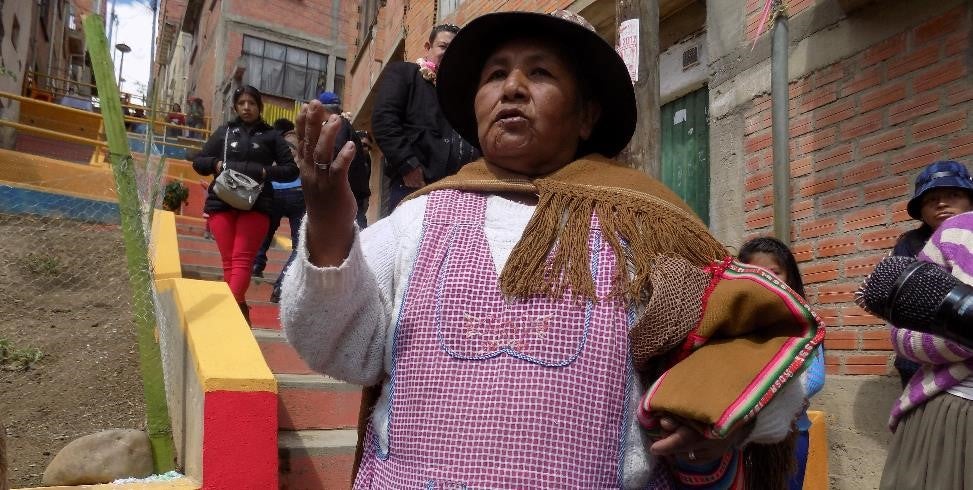 Photo of a woman in Latin America
Photo of a woman in Latin America
Women world over continue to face cultural, socio-economic and legal inequalities that prevent their full participation in society. They are often overrepresented in informal settlements, carry most of the caregiver burden, and face increased risk of gender-based violence. A disproportionate number of women live in insecure, unsafe conditions and significant barriers remain to women’s ownership and control over assets.
But change is possible.
“I never imagined to be able to own my home, I feel I now have something I can leave to my son. I take care of my job to be able to continue paying for my home,” says 44-year-old Marta of Tecámac, Mexico.
Marta is one of the over 15,000 female beneficiaries of a World Bank-supported housing initiative in Mexico, who have talked about how access to housing has enhanced the quality of life for women in her community. On International Women’s Day, we’d like to shine a spotlight on how addressing gender gaps in housing interventions, through projects like the one in Marta’s community, can spark positive benefits for women and their families in some of the world’s most underserved communities.
Secure housing and property rights can be lifechanging for women. It can increase their participation in a household’s decision-making process, access to income (through rentals, sale, or use of the home as collateral), and enhance women’s role in the household and community.
Access to quality housing also improves women’s wellbeing. The security of living in a quality home has a tangible impact on their mental health by reducing their stress, anxiety, and depression, increasing their self-esteem and satisfaction, while it also helps their physical health by providing a space for better cookstoves and ventilation, helping reduce gastrointestinal and respiratory problems, especially for women who generally spend more hours at home than men. Less crowded and better housing conditions also reduce infection and mortality rates of communicable diseases – which is critical as we contend with the COVID-19 pandemic. Provision of tenure, services and home technologies also ultimately help increase women’s productivity and participation in the labor market and encourages them to take up home-based micro-entrepreneurial activities, like a meal service or provision of childcare.
Locating new housing developments close to markets and manufacturing centers can also provide women with job opportunities. Housing projects can also generate new jobs for women by providing training on marketable skills or prioritizing female-led small and medium enterprises. For example, a project in Comoros to rebuild after Cyclone Kenneth promotes women’s participation in infrastructure rehabilitation and construction activities, through gender sensitization of contractors, outreach activities regarding reconstruction job opportunities and trainings that target women by requiring a quota for women in the bidding documents for contractors. Clearly, improving economic standing amongst women can greatly impact their ability to access housing finance to rent, purchase or construct quality dwellings.
Evidence also shows that structurally safer homes can also significantly reduce losses of life during natural disasters, where women and children are 14 times more likely to die than men. During the Haiti earthquake in January 2010, for example, more women were at risk for death because Haitian women customarily stayed at home to take care of young children or were likely to be working in or around buildings that collapsed. In addition, in a post-disaster or post-conflict context, safer living conditions also help decrease sexual violence against women and girls.
Finally, housing projects can promote reforms of legal regimes around land and property acquisition in the case of marriage or inherence and raise public awareness through education initiatives that can contribute to change cultural norms, which are additional ways women are often marginalized compared to men. For example, with World Bank and Afghanistan Reconstruction Trust Fund support, efforts are underway to ensure that land administration and women's property ownership laws are implemented in practice. Given the social, economic, and cultural importance of property ownership, equitable access to land is key to empowering Afghan women.
Changes in legal and institutional frameworks and in cultural and social norms impact the extent to which women enjoy access to ownership and control over property.
Effective participation of women at all levels in the development of housing enhances their empowerment, strengthens their voice and gives them agency. There is so much more to be done on this front, but through collaboration and the design of projects that address critical gender gaps, we can make substantial progress to foster more equitable societies and prosperous cities.




Join the Conversation